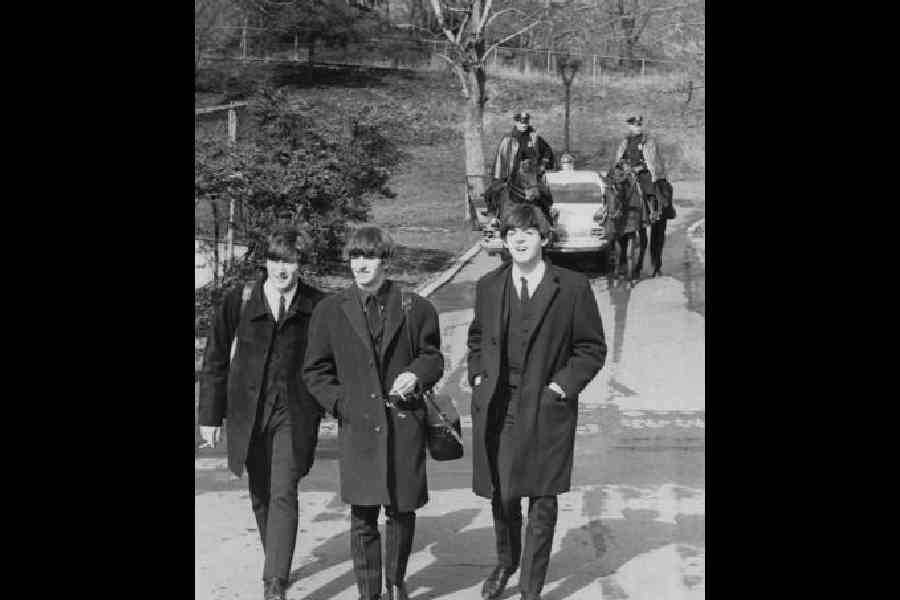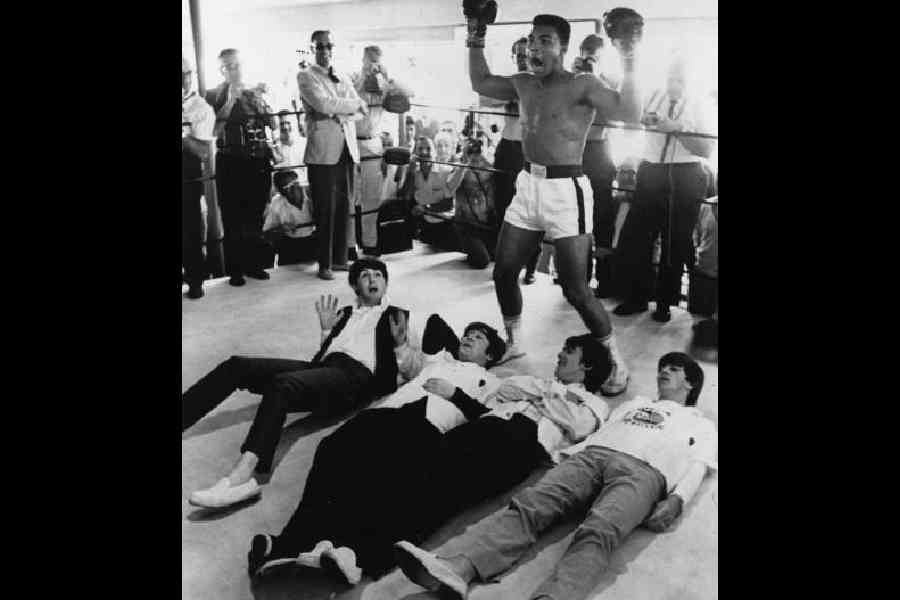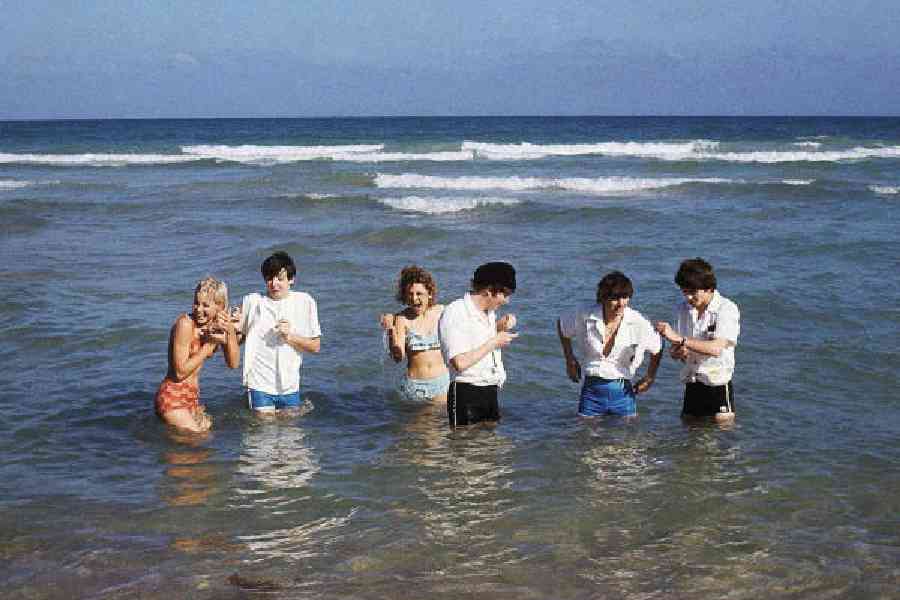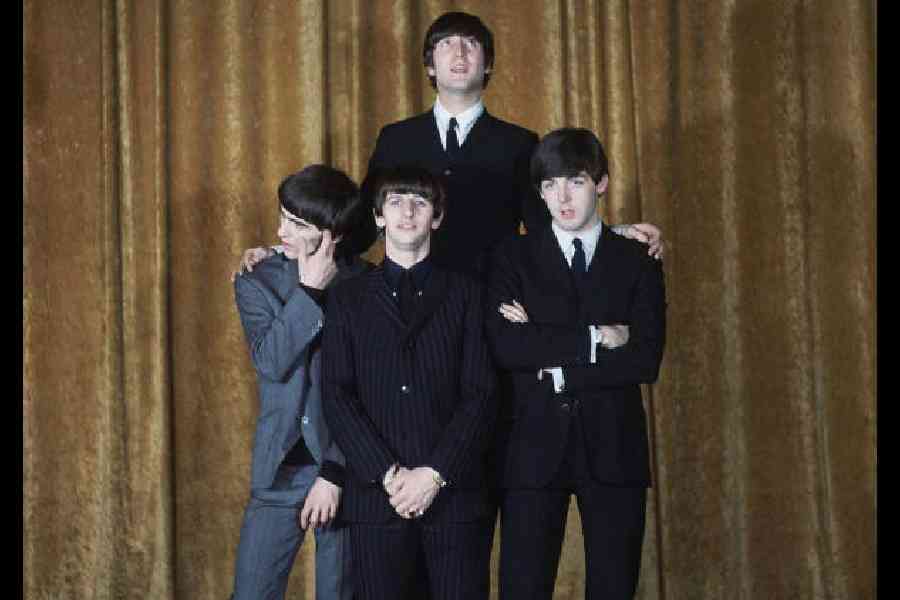Multiply Elvis Presley by four, subtract six years from his age, add British accents and a sharp sense of humour. The answer: It’s the Beatles” — the Fab Four got a brilliant introduction in a newspaper in the US when they first arrived on the other side of the Atlantic on February 7, 1964. Beatlemania invasion reached a new peak and the music industry wouldn’t be the same again.
Capturing the hysteria and the aftermath is a new documentary — Beatles ’64 — set to unroll on November 29, directed by David Tedeschi and one of the producers being the forever Beatles fan, Martin Scorsese.

Left to right: John Lennon, Ringo Starr and Paul McCartney in Central Park, New York, on February 8, 1964
A dream come true
Britain’s most successful export arrived at Kennedy International Airport to screams of 3,000 teenagers (some add a thousand to the figure). By then the quartet had already sold six million records and earned at least $10,000 a week for appearances. They were young chaps who didn’t know how long the Beatlemania would last — Paul McCartney was 21, John Lennon was 23, George Harrison too was 21, and Ringo Starr, 23.
“None of us has quite grasped what it is all about yet it’s washing over our heads like a huge tidal wave. But we’re young. Youth is on our side. And it’s youth that matters right now. I don’t care about politics,” Ringo told The Sunday Times in London, declaring his ambition was “to be happy”. Their dreams were simple. George’s ambition was “to design a guitar”, John wanted “to write a musical” but it was Paul’s dream that was ultimately shared by all: “To be successful.”

February 1964: Muhammad Ali poses in the ring in mock victory over the Beatles
For any pop star, breaking America was the ultimate dream. It still is, if you look at the career chart of Rolling Stones to Wham to Take That and One Direction. Many had tried before the Beatles but none had successfully made the breakthrough. American music had been the inspiration for these four young men, with even the skiffle music of The Quarrymen having its roots in American bluegrass and folk. As writer Hunter Davies once pointed out, to play in the country that had produced Buddy Holly, Little Richard, Chuck Berry and, of course, Elvis Presley, was a dream come true. And for anyone brought up in post-war austerity Britain, just to visit the US was an excitement in itself.
It was delicious madness the young musicians revelled in. Booked into individual Cadillacs, they made their way to the Plaza Hotel to check into a 10-room suite with a round-the-clock security guard.
Their first appearance was set for the hugely popular Ed Sullivan Show, followed by a visit to Washington for a concert at the Coliseum and then two shows at Carnegie Hall. Then they were supposed to accompany Sullivan to Miami Beach for a performance at Deauville Hotel.
But before that came their meet-the-press moment, which had plenty of journalists and screaming fans. The questions were crisp, answers were crisper. “Will you sing for us?” John replied: We need money first.” “How do you account for your success?” Once again, John to the rescue: “We have a press agent.” Ringo was asked what he thought of Beethoven: “I love him, especially his poems.” Then a reporter expressed the frustration of many parents: “Hey, you’re keeping our kids outta school!” A clever John took the remark by the horns: “That’s a dirty lie.” At that point, Paul chimed in: “We have a message.” Everyone thought it would be important. The singer continued: “Our message is to buy more Beatles records!”
The Holy Grail
By the time they had touched down in New York, I Want To Hold Your Hand was in its second week at number one. For a brief moment, dark clouds circled above their visit. George was unwell at the beginning of their stay in New York. To ensure his recovery, he had to miss a rehearsal for The Ed Sullivan Show on the morning of the first live broadcast. But then the clouds disappeared.
“We’d seen a lot of British stars come back from America with their tails between their legs. We made a promise to ourselves to not go until we had a No. 1. We were so excited to be madly popular in America, which was to us the Holy Grail because every shred of music we ever loved came from there. It was euphoric, and now we were heading to Washington on the train, which was very glamorous. And to cap it off, there was that beautiful snow,” Paul later said.
A high point of their visit was meeting Cassius Clay, whom we know as Muhammad Ali. The four of them were captured lying inside the ring while the boxer struck mock poses. “Well, I didn’t want to hurt him,” Ringo said.
By the time their visit was over, they had cemented a unique kind of fame: “We four guys from Liverpool couldn’t possibly realise then the implications of what we were doing. By the end of February 1964, after our visit to America and three appearances on The Ed Sullivan Show, we finally had to admit that we would not, as we had originally feared, just fizzle out as many groups do. We were in the vanguard of something more momentous, a revolution in the culture,” Paul wrote in 2023.

The Beatles in Miami in February 1964
The new Beatles documentary will be accompanied by the November 22 release of all seven American Beatles albums in a vinyl reissue collection entitled The Beatles: 1964 U.S. Albums in Mono.











